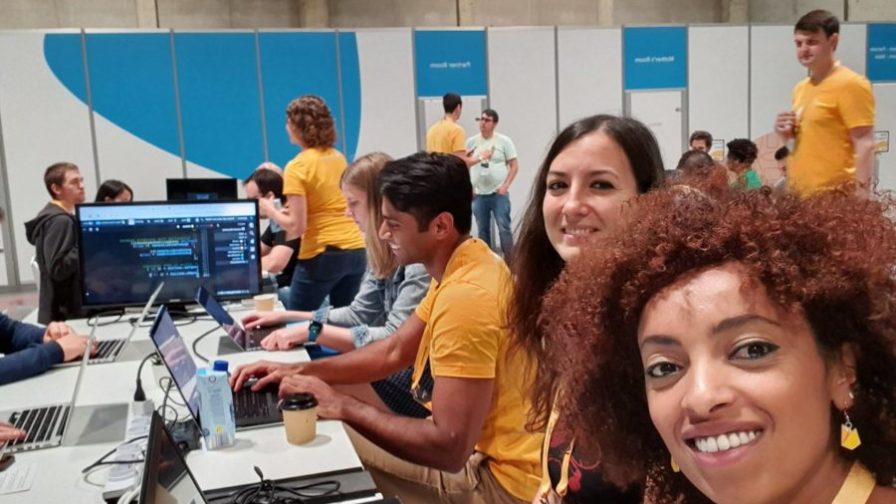
Rihanna Kedir is co-lead of Google Developer Group (GDG) in Rome, and ambassador of Women Techmakers, a Google’s program that provides visibility, community, and resources for women in technology. We interviewed her to learn more about the experience of being involved in such communities, and how this can bring value to a developer’s career.
Before you keep on reading, let us suggest you read our full guide on how to be a better developer community manager and go through our list of the best tools for planning a virtual conference.
Women Techmakers and GDG
Hi Rihanna! Please tell us about you and your tech communities, their members and objectives.
I am Women Techmakers Ambassador and Google Developer Groups Rome co-lead. Women Techmakers is Google’s program that provides visibility, community, and resources for women in technology. GDG is a global community and provides a place for developers to connect.
Members meet other local developers with similar interests in technology. Our events include talks on a wide range of technical topics where you can learn new skills or improve tech skills through hands-on workshops and study jams.
Being a Tech Community Manager
What is it like being a tech community manager in Italy? What is the tech scene in your country?
We are in Rome, where there are a good number of tech communities. Based on the interest and on the technology, there are different meetups, events and conferences that one can attend too. As a community manager, in some way that obliges you to continuously check out the different events and communities in order not to schedule events that overlap or are repetitive.
What were the biggest problems you’ve had to overcome and how have you done this?
It is more a challenge rather than a problem, but as Women Techmakers Ambassador one of the challenges in increasing women and minorities participation in the events we organize. To overcome that we participate in different local events and initiatives and we try to reach out to invite personally at our events or either propose and organize events that could be valuable. For instance IamRemarkable is a workshop that we organized in February of this year. A workshop dedicated for empowering women and underrepresented groups to celebrate their achievements in the workplace and on privacy.
Diversity in Tech
So it seems that encouraging diversity is crucial within your tech community. How important is it to have a code of conduct? Have you ever had to apply it?
Our tech community is led by majority women with different tech expertise and background. We encourage Diversity and we always try to create ‘safe’ events where everyone feels welcomed and included. As a black woman, I can say I am a minority in tech and one of my reasons for becoming a Women Techmaker ambassador is to encourage diversity. Having a code of conduct is helpful. Fortunately, during my leading time, it never happened to apply it and I am glad for it.
Why and how to become a Community Manager
Why did you decide to become a community manager, and what is the most valuable thing you got in return? How do you balance your work time and personal life with being a community manager?
I have been mentoring and volunteering in local tech communities for years. Participating in communities helped me grow professionally and personally a lot. And that is what inspired me to become a tech community organizer as a way to contribute back.
In terms of balancing work and personal life with community manager activities, well, I like to do it, in some way I feel like I have always done it and I take that as part of ‘entertainment’ somehow. One important thing though is the relationship that you have with the other leads, organizers, active members.
In our community, we communicate with the organizers almost daily and we support each other a lot. That helps to split activities and responsibilities based on how busy is one in personal and work life and also based on how good is one to do the required activities.
What skills and experience does a tech community manager need? What is the secret to building relationships in a tech community, and how do you maintain these relationships?
Among the skills needed to be a community manager, I believe good communication skills is a good start. In order to build relationships and maintain these relationships, you have to be able to talk to people and you have to listen to what they expect. Being able to listen to community members and understand their expectations helps to succeed in organising the next events.
In our community we organize events with some objectives, such as getting certified, learning new technologies and we try our best to engage the interested persons and help out till we reach together the objectives. During these multiple events we have established good relationships with our members, and friendships among participants.
The other skill is to be agile, you might need to act proactively and with creativity in certain situations. One other skill is also organizational skill, you are constantly juggling various projects and coordinating with different people and having good organizational skills will help a lot.
The Success of a Tech Community
Please, list some dos and don’ts for aspiring tech community managers. What distinguishes a good tech community from a bad one?
Dos and don’t might depend on different factors: the purpose of your community, what do you aspire for in your community etc…
For me here are some dos:
- make sure your passionate with the purpose of the community and you believe in it
- remember that social media and community are rooted in human interaction and relationships. So Focusing on the relationship is as much as important as promoting socials
- be collaborative and supporting with your members, your participants and other local tech communities
- try to predict participants expectation when organizing events and, if possible, adjust content based on that
- recognize and reward behaviours, activities and contributions of active members
- appreciate and thank collaborating people in your community
- be welcoming and friendly for new members
The only ‘don’t’ is: don’t think you can do it all by yourself, that will be exhausting and you miss the fun of it. Any community is about people and you need people to collaborate with you.
What do you consider the best metrics for evaluating the success of a tech community?
Apart from the continuous affluence of new members, how effectively the participation in the community is valuable to the community members in terms of tech improvements but also personal improvements, which it is difficult to express in terms of metrics, but still you can evaluate with comments and feedback and members’ stories.
When organizing multiple events with objectives, such as getting certified or studying new tech together, the metric is how many participants reached the goal at the end. Another metric is having a good number of active members that feel engaged in the community.
What are the most important tools of the trade, for you?
- Grow communication skill and negotiation skills
- Be open minded, collaborative and supportive
- Be authentic in your communication
- Learn to build long-lasting relationships
What books, articles, videos, experts and conferences would you suggest to other tech community managers?
My personal suggestion is to participate in other local tech communities, learn on the field and in your context. Checkout a specific skill you need to improve, it could be organizational skill, communication and negotiation skill or any other skill you might feel you need to work on.
Do you think tech communities can have a role in shaping a better tomorrow?
Yes. I believe tech communities can have a role in shaping a better tomorrow. In a healthy and responsive tech community passionate people network with each other, spread know-how and experience and support each other. Good ideas and projects can come out of that and that contributes to society and for better tomorrow.
What advice do you wish you had been given when you started your community?
While participating in tech events I always saw the good part of the event/meetup, and may underestimate the work done behind the scene. I am still learning, and I believe, improving.
The advice I wish I have reflected on before starting this journey, which relates also to my journey in the tech world in general is: as much as improving on technical growth, it is important to develop soft skills. For example conflict handling, public speaking, listening and developing a good grasp of people’s motivations, understanding people etc..
